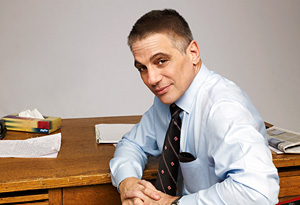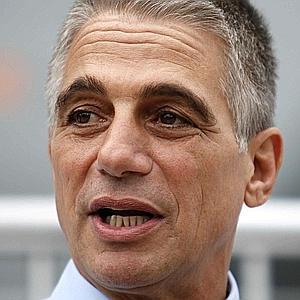Books: “I’d Like to Apologize to Every Teacher I Ever Had”
October 8, 2012

When I was teaching English grammar and composition at a New Jersey prison, one of my students told me about a visit he had received from his grandmother. “She told me she got the first letter from me that wasn’t all one sentence! That’s your fault, Mr. Paolino!” It was one of the nicest things anyone had ever said to me.

Tony Danza as Tony Banta in “Taxi“
I have never been a full-time teacher, but I have taught many college classes over the past 40 years or so, and in some cases the students really weren’t prepared for college. In recent years, I taught a lot of remedial English courses; the number of kids who need remedial English after graduation from high school is quite a scandal.
My experiences gave me a little extra appreciation of this book — I Want to Apologize to Every Teacher I Ever Had — written by the actor Tony Danza after he spent a year teaching an English class at Northeast High School in Philadelphia.
Danza, who first became a nationally known figure for his portrayal of cabbie and boxer Tony Banta in the TV series Taxi, writes that he had always harbored an ambition to be a teacher. When his most recent TV show was cancelled, he decided to fulfill that ambition. According to him, he loathes reality TV and did not intend for his experiment to become a television series, but it happened anyway.
The A&E network set out to create a series based on Danza’s stint in the classroom, but Danza writes that it was an uneasy relationship because the network wanted drama and was willing to stage it if it didn’t occur naturally, and Danza writes that he wanted the camera to record only what happened in the normal course of events.
Danza taught a double class … two 45-minute periods with the same students. But he had to show up in the morning at the same time as the other teachers and take on all the obligations they had outside the classroom: truancy duty, coaching sports, chaperoning dances, and attending planning meetings and in-service programs.
Not everyone in the school was happy to have him there, and there were several instances in which he got into trouble for violating procedures. For example, he took his students on a field trip to Washington, D.C., but he didn’t tell their other teachers that the kids would be absent from school that day.
Danza was feeling his way in teaching an English course for the first time, but it sounds as if he became a pretty creative instructor, particularly in the way he presented literature and prompted the students to see its relevance to everyday life. In that urban setting, Danza writes, he came face to face with the problems that many kids lug around with them every day, kids with dysfunctional families, kids who live in an atmosphere of violence, kids with no self esteem. And, of course, he came face to face with the impact such problems have on teachers.
In that urban setting, Danza writes, he came face to face with the problems that many kids lug around with them every day, kids with dysfunctional families, kids who live in an atmosphere of violence, kids with no self esteem. And, of course, he came face to face with the impact such problems have on teachers.
Danza, who writes that he was a problem student at a Long Island high school, rode an emotional roller coaster at Northeast, sometimes parenting troubled kids, sometimes losing his temper — not an unusual experience for him — and sometimes succumbing in tears.
Danza came away from Northeast with some strong feelings about public education being underfunded, and about teachers and administrators being under appreciated, under compensated, and stymied by bureaucratic interference.
Of course, I didn’t accompany Danza to Northeast High School, so I can’t vouch for everything he writes about his time there. What I especially like about this book, though, is that it seems to be written in his voice. Anyone who is familiar with Danza as an actor can hear him speaking these words, and that makes them seem all the more credible.
“No Vivaldi in the garage!” — Louie De Palma
May 20, 2011
Like everyone else, I suppose, I was very sorry to read that Jeff Conaway was comatose in a hospital in Encino. Conaway occupies a special pantheon in my family because of his role as Bobby Wheeler on the television series Taxi. Like some other entertainment media, television can do that for a person, throw at least one role his way that guarantees that his career will never be thought of as altogether ordinary.
Conaway was perfectly cast as the egotistical but insecure young actor, and he played the part in the midst of an ensemble of performers, many of whom were already experienced and all of whom were also perfectly cast. This fact, plus the excellent writing, made Taxi, one of the best situation comedies in television history.
There were 114 episodes of Taxi from 1978 to 1983, and every one was an artistic success. The series won 18 Emmy awards, a fact that speaks for itself.
The cast was remarkable: Judd Hirsch, Danny De Vito, Rhea Perlman, Christopher Lloyd, Andy Kaufman, Carol Kane, Marilu Henner, and Tony Danza. The selection of Danza was a particular stroke of genius. He was a prize fighter (9-3) when he was cast as boxer/cab driver Tony Banta and, although he had been type cast, he displayed impressive acting acumen, including pinpoint timing and a worthy double take, throughout the series.
Besides the regular cast, the producers imported outstanding guest players, including Julie Kavner, Barry Nelson, Louise Lasser, Jack Gilford, Ruth Gordon, Wallace Shawn, J. Pat O’Malley, Victor Buono, and Vincent Schiavelli.
A particular strength of the writers of Taxi was their ability to create unique characters – the nasty dispatcher Louie De Palma (De Vito), the dizzy immigrant Latka Gravas (Kaufman), the pickle-brained Jim Ignatowski (Lloyd), and the glowering Reverend Gorky (Schiavelli). The faux Eastern European language spoken by Latka, his wife Simka (Kane), Reverend Gorky, and Latka’s mother and cousin, was an ingenious and hilarious invention.
Taxi dealt with ordinary people with recognizable, ordinary problems, and in the context of its comedy it tastefully touched on sensitive topics such as bisexuality, blindness, old age, single parenthood, obesity, premenstrual mood disorders, drug addiction, and sexual harassment. Taxi’s writers never went for cheap laughs.
Taxi was similar to The Honeymooners in its heyday in the sense that it had a kind of grim realism. Until Jackie Gleason made the fatal error of moving the Kramdens and Nortons out of their tenement milieu, a haunting aspect of that show was the realization that those folks were never moving out of that neighborhood, Ralph and Ed were never leaving the bus company and the sewer system, no matter how hard they dreamed. The same thing was true of the characters in Taxi –ironically, with the exception of Bobby Wheeler– and the writers were faithful to that truth.





